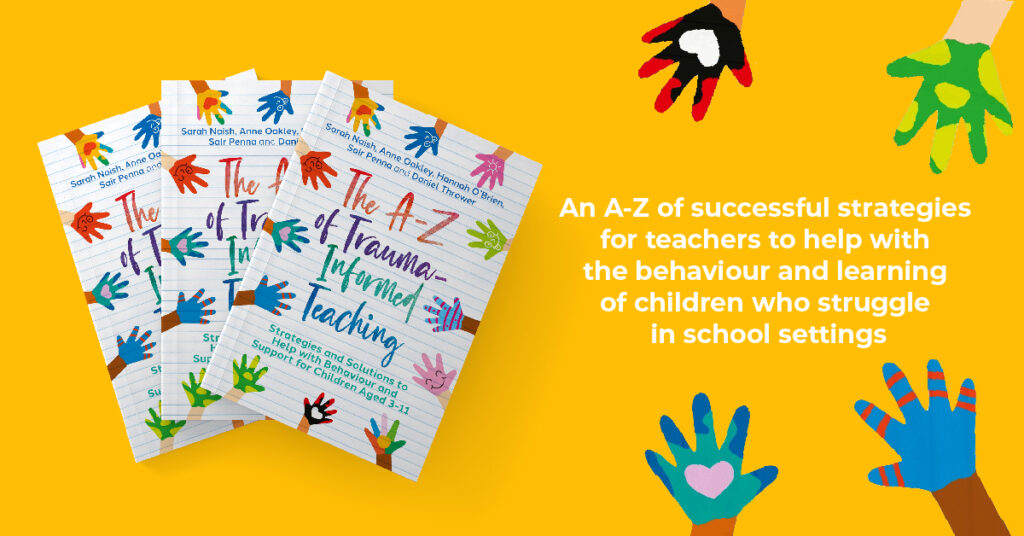
There is currently far more awareness in education settings about the impact of adverse childhood experiences and childhood trauma. Training around trauma informed approaches provides an understanding of how early child development is impacted and how we can help children develop emotional regulation skills. Generally, however, it offers us very little guidance in terms of the practical application, needed for the day-to-day care of inattentive, disengaged and distressed children, within our busy settings.
There is also a growing concern that many of our youngest children are not as developmentally ‘school ready’ as they used to be. Indeed, our primary schools have met with a tsunami of needs; financial limitations, overwhelmed teaching teams, together with children whose confusing responses (non-compliance, running, hiding, inattention, aggression and destruction) often mask huge levels of fear and undeveloped skills. It would appear that an increasing number of children are struggling to flourish with the demands and expectations of our busy mainstream classrooms. With this their parents, who all too often feel judged, frustrated and very sadly, marginalised from the very beginning of their child’s education.
Our lifestyles and environments are also forever changing. The way we teach children and our accompanying ‘school shaped’ mind-sets however, have pretty much remained unchanged for hundreds of years. Typically, we actually know very little about how the brain – the ‘learning organ’ works or how its development can be interrupted. We tend to apply our knowledge of brain development to just a few children in our care – those we know have experienced adversity, rather than see that a trauma informed approach supports everyone (child and adult) emotionally and psychologically in our settings.
There may be several reasons, why children have missed the early experiences needed to trust adults and develop brains in line with the neurotypical, age related targets our education system sets. Many children, whether they have experienced childhood trauma, or they are neurodivergent, need support to manage developing or different learning styles, sensory systems, nervous systems, emotions, actions and responses. These, are the foundational self-regulation skills all children need to develop and it is these, that we must now prioritise, in order to support children’s emotional wellbeing, learning and future mental health. After all, no child will ever be excluded for poor academic performance.
We were therefore thrilled that Sarah Naish approached us to write The A-Z of Trauma Informed Teaching based on the original format for her best-selling A-Z of Therapeutic Parenting. Sarah Naish is Chief Executive Officer and founder of the Centre of Excellence in Child Trauma (www.coect.co.uk) and founder of the National Association for Therapeutic Parents (www.naotp.com). Daniel Thrower and Anne Oakley from The Wensum Trust (www.wensumtrust.org.uk) have wide-ranging experience supporting children who have experienced trauma and attachment difficulties, in primary mainstream education. Hannah O’Brien has boundless enthusiasm and is the founder of inspirational alternative provisions in Gloucestershire (Wickselm House Learning Centre, www.wickselmhouse.com and Manor Farm Fun, www.manorfarmfun.co.uk). Sair Penna has had long-term success coaching and training families in therapeutic parenting and wellbeing through The Centre of Excellence in Child Trauma and National Association of Therapeutic Parents.
This book has not been designed to deliver reams of theory about developmental trauma, attachment and social and emotional mental health, or provide scientific evidence around the developing brain. We write from an authentic perspective; all having current first-hand experience, the tribulations and celebrations of teaching, or as parents of neurodiverse children negotiating the education system. Its evidence base comes from our immense, combined and ongoing experiences working in our own communities and from the outstanding endorsements written by our respected endorsers.
We wanted this book to be something you could reach for quickly in times of stress and much needed inspiration, as well as a book you can come back to in more detail, when time allows. Part 1, provides an overview of common behaviours and underlying factors in children who have experienced developmental trauma. Part 2, contains an A-Z list of the most frequent challenges we see, with some suggestions for related strategies and points for consideration.
The A-Z of Trauma Informed Teaching is quite simply the book we wished we could have laid our hands on during our lunch hour! The hidden beauty, we have come to realise, is that if you can always be curious and empathetic towards every young child whose responses challenge your ‘school shaped’ mind-set, if you can truly climb into their world, then you will begin to understand and accept the needs of every child and adult, and your own needs too.
A one-size-fits-all approach to learning no longer works for every child, if it ever did. If we are to truly help all children grow and learn in all areas of their life, then we need a greater understanding of the behaviour we see. We very much hope that this book guides you to do just that and that together, we can influence much needed educational system and policy change.
